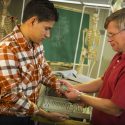Students flex entrepreneurial muscle in competition
What do a discarded industrial fan, a recycled wastebasket, a surplus fishing reel, and a set of drawers from an old lab desk have to do with entrepreneurship at the University of Wisconsin–Madison campus?
Everything.
The winners of the first-ever 100-hour Wiscontrepreneur Challenge include a home reservoir system that stores rain water and pumps it into gardens and lawns; a hand-cranking portable power generator; an artistic, wall-mounted light fixture, called a sconce; and a projected million-dollar business from the sale of recycled state office furniture. Each of the winning students and teams will receive a check for $300 donated by Venture Investors LLC, one of the premier providers of seed and early stage venture capital in the Midwest.
The 100-hour Wiscontrepreneur Challenge winners include:
- Most Creative: Reel Power by Matthew Brener of Elgin. Ill; Erica Bjoraker; and Matt Michalak of Independence, Wis.
- Most Value Created: Tie between Impregnated Wall Sconce by Brittany Seabloom of Rhinelander; and SWAP for $1Million a Year by Richard Qian and Jake Stauber.
- Most Social Value Created: Renewable Water Supply by Peter Dykstra of Winnetka, Ill..
- "People's Choice" Award: Renewable Water Supply by Peter Dykstra of Winnetka, Ill., (who collected 1,250 unique page views).
"We are enormously impressed with the talent and creativity of all the student entries," says Charles B. Hoslet, managing director of the Office of Corporate Relations (OCR) at UW–Madison, originator of the 100-hour Wiscontrepreneur Challenge. "Our winners represent a variety of academic fields, from business to the arts, and we congratulate all of them on their success."
Adds Linda Zwicker, development program manager with the UW–Madison School of Human Ecology, and one of the three judges: "I continue to be impressed with the creativity and spirit exhibited by UW–Madison students. What a marvelous project!" As explained by Hoslet, the 100-hour Wiscontrepreneur Challenge provided students with $10 vouchers redeemable for materials at the UW-Madison SWAP (Surplus With A Purpose) Shop, which sells used university equipment and supplies.
The students had 100 hours over the Earth Day (April 22) weekend to turn those scraps and recyclables into marketable inventions and post them on a public Web site. A team of three judges, including Zwicker, then selected winners in each of three categories – most financial value, most creativity and most social benefit. In addition, a $100 "People's Choice" award was given to the entry that was viewed by the most people.
A total of 12 individuals and teams entered the competition, producing a range of innovations that ran the gamut of originality, practicality, and fun.
UW-Madison senior Peter Dykstra, for example, constructed a device that collects water from gutters, stores it in a basin and then electrically pumps it to flower beds or lawns using plastic tubing. The inspiration for his idea for a home reservoir system came from an old industrial fan and a water pump at SWAP which cost less than $10 total.
"I am excited to have the opportunity to participate in this contest and enjoyed every step of the process," says Dykstra, whose "Renewable Water Supply" was judged to have the most social benefit and was also the winner of the "People's Choice" award as the most viewed entry. "It was a great opportunity to 'think outside the box' and shows how a small investment of time and money can result in a valuable concept or item. Because of this competition, I will be much more willing to invest in future entrepreneurial ideas, and I plan to set aside much of the award money for such projects."
UW-Madison junior Brittany Seabloom also has the entrepreneurial spirit as a result of the contest. Her "Impregnated Wall Sconce" was awarded a prize for "most value created."
"I was really surprised to see my product as 'most valuable,'" says Seabloom. "I've actually sold a piece like the one I made for the contest before, so to have the judges think that it has some monetary value has really started me thinking about producing and selling my light fixtures, as a business. After all, I know that I can make at least one in 100 hours!"
The 100-hour Wiscontrepreneur Challenge is just one of several activities that OCR and UW–Madison are sponsoring to generate interest in entrepreneurship campus-wide. UW–Madison is one of only 22 campuses nationwide to receive a grant from the Ewing Marion Kauffmann Foundation of Kansas City to help build the spirit and skills of entrepreneurship among all students. Eventually, work related to the Kauffman grant will quickly move around the state.
"Every citizen of the state is a potential 'student,' and we intend to incorporate entrepreneurship into the value proposition of what UW–Madison offers to the people of Wisconsin," says Hoslet. "We want UW–Madison and Wisconsin to lead the nation in entrepreneurial thinking and creativity."



